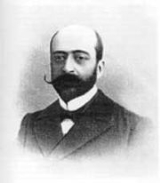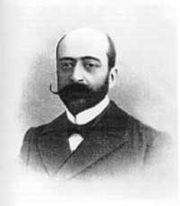
Pavel Krushevan
Encyclopedia

Black Hundred
The Black Hundreds , also known as the black-hundredists was an ultra-nationalist movement in Russia in the early 20th century. They were a supporter of the House of Romanov and opposed any retreat from the autocracy of the reigning monarch...
ist and was known for his far-right, ultra-nationalist and openly antisemitic views and was the first publisher of The Protocols of the Elders of Zion
The Protocols of the Elders of Zion
The Protocols of the Elders of Zion is a fraudulent, antisemitic text purporting to describe a Jewish plan for achieving global domination. It was first published in Russia in 1903, translated into multiple languages, and disseminated internationally in the early part of the twentieth century...
.
Born Pavolaki Krushevan into a family of impoverished Russianized Moldavian aristocrats
Aristocracy (class)
The aristocracy are people considered to be in the highest social class in a society which has or once had a political system of Aristocracy. Aristocrats possess hereditary titles granted by a monarch, which once granted them feudal or legal privileges, or deriving, as in Ancient Greece and India,...
in the village Gindeshty (now Ghindeşti
Ghindeşti
Ghindeşti is a town in Floreşti district, Moldova....
, Floreşti district, Moldova
Moldova
Moldova , officially the Republic of Moldova is a landlocked state in Eastern Europe, located between Romania to the West and Ukraine to the North, East and South. It declared itself an independent state with the same boundaries as the preceding Moldavian Soviet Socialist Republic in 1991, as part...
) Bessarabia
Bessarabia
Bessarabia is a historical term for the geographic region in Eastern Europe bounded by the Dniester River on the east and the Prut River on the west....
n guberniya
Guberniya
A guberniya was a major administrative subdivision of the Russian Empire usually translated as government, governorate, or province. Such administrative division was preserved for sometime upon the collapse of the empire in 1917. A guberniya was ruled by a governor , a word borrowed from Latin ,...
(село Гиндешты Сорокского уезда Бессарабской губ.), he completed four grades of school.
Krushevan served as a clerk in Chişinău
Chisinau
Chișinău is the capital and largest municipality of Moldova. It is also its main industrial and commercial centre and is located in the middle of the country, on the river Bîc...
City Duma
Duma
A Duma is any of various representative assemblies in modern Russia and Russian history. The State Duma in the Russian Empire and Russian Federation corresponds to the lower house of the parliament. Simply it is a form of Russian governmental institution, that was formed during the reign of the...
. His writings were first published in 1882. In 1887-1896, he worked as a journalist in newspapers Минский листок (Minsky Listok, The Minsk
Minsk
- Ecological situation :The ecological situation is monitored by Republican Center of Radioactive and Environmental Control .During 2003–2008 the overall weight of contaminants increased from 186,000 to 247,400 tons. The change of gas as industrial fuel to mazut for financial reasons has worsened...
Post), Виленский вестник (Vilensky Vestnik, The Vilnius
Vilnius
Vilnius is the capital of Lithuania, and its largest city, with a population of 560,190 as of 2010. It is the seat of the Vilnius city municipality and of the Vilnius district municipality. It is also the capital of Vilnius County...
News), and Бессарабский вестник (Bessarabsky Vestnik, The Bessarabia News).
During the decade that followed, Krushevan founded and served as a publisher and editor of several newspapers:
- In 1897, Chişinău daily newspaper Бессарабец (Bessarabets, The Bessarabian) which published materials fomenting anti-Semitism. Krushevan was reported as being one of initiators of the Kishinev pogromKishinev pogromThe Kishinev pogrom was an anti-Jewish riot that took place in Chişinău, then the capital of the Bessarabia province of the Russian Empire on April 6-7, 1903.-First pogrom:...
in April 1903. - In 1903, Saint PetersburgSaint PetersburgSaint Petersburg is a city and a federal subject of Russia located on the Neva River at the head of the Gulf of Finland on the Baltic Sea...
daily newspaper ZnamyaZnamya (newspaper)Russkoye Znamya — a newspaper, organ of the Union of the Russian People established in Petersburg by Alexander Dubrovin on , notoriously known for its antisemitic bias.Discontinued on by the order of Petrograd Soviet.-History:...
, where the first (abridged) edition of The Protocols of the Elders of Zion was published in series from August 28–September 7 O.S., 1903. - In 1906, Kishinev newspaper "Друг" (Droog, The Friend).
Krushevan promoted ultra-nationalist and racist views and was brought to court numerous times for slander, verbal offenses and physical threats. After a homicidal attempt by a P. S. Dashevsky, it was reported that Krushevan lived in constant fear, kept weapons close at hand and was accompanied by a personal cook out of fear to be poisoned.
In 1903 a riot started after an incident on February 6 when a Christian Russian boy, Michael Rybachenko, was found murdered in the town of Dubăsari
Dubasari
Dubăsari is a city in Transnistria, with a population of 23,650. The city is under the administration of the breakaway government of the "Transnistrian Moldovan Republic", and functions as the seat of the Dubăsari sub-district, Transnistria, Moldova.-Name:The origin of the town name is the plural...
, about 25 miles north of Chişinău. Although it was clear that the boy had been killed by a relative (who was later found), Бессарабец, published by Pavel Krushevan, insinuated that he was killed by the Jews instigating the Kishinev pogrom
Kishinev pogrom
The Kishinev pogrom was an anti-Jewish riot that took place in Chişinău, then the capital of the Bessarabia province of the Russian Empire on April 6-7, 1903.-First pogrom:...
.
In 1905 Krushevan organized the Bessarabian Patriotic League. He founded the Bessarabian branch of the Union of the Russian People
Union of the Russian People
The Union of Russian People — a loyalist right-wing nationalist party, the most important among Black-Hundredist monarchist and antisemitic political organizations in the Russian Empire of 1905–1917....
.
From 1906 to 1909 he served as a speaker of Kishinev city Duma.
In 1907 Krushevan was elected to represent Kishinev in the 2nd Russian State Duma
State Duma
The State Duma , common abbreviation: Госду́ма ) in the Russian Federation is the lower house of the Federal Assembly of Russia , the upper house being the Federation Council of Russia. The Duma headquarters is located in central Moscow, a few steps from Manege Square. Its members are referred to...
.
See also
- History of the Jews in Bessarabia
- History of the Jews in Russia and the Soviet UnionHistory of the Jews in Russia and the Soviet UnionThe vast territories of the Russian Empire at one time hosted the largest populations of Jews in the diaspora. Within these territories the Jewish community flourished and developed many of modern Judaism's most distinctive theological and cultural traditions, while also facing periods of...
- Protocols of the Elders of Zion
External links
- Rosenthal, Herman and Rosenthal, Max, "Kishinef (Kishinev)", in the Jewish EncyclopediaJewish EncyclopediaThe Jewish Encyclopedia is an encyclopedia originally published in New York between 1901 and 1906 by Funk and Wagnalls. It contained over 15,000 articles in 12 volumes on the history and then-current state of Judaism and the Jews as of 1901...
(1901–1906) - Century of Hatred: 'Protocols' Live To Poison Yet Another Generation

